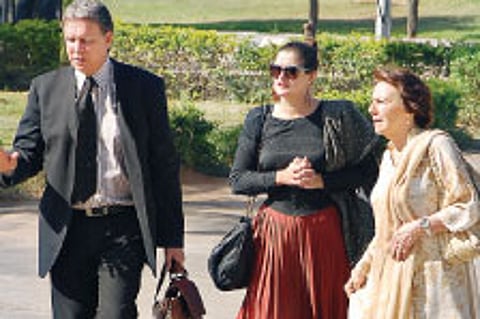

The Hyderabad Literary Fest 2013 began on Friday on an optimistic note. Its focus this time is Telugu literature. For those who think Telugu literature is fast becoming a forgotten chapter, the turnout could be an eye-opener, take it either positively or otherwise. Depends on how you look at it. Padma Vibhushan awardee Sitakanth Mahapatra, who inaugurated the festival along with Governor ESL Narasimhan, captured the essence of literature in one sentence – it is a reflection of one’s self which is the real mystery that words try to decipher.
The poet’s insightful remarks set the tone for the rest of the proceedings. The panel discussion on Telugu was obviously the highlight of the day. It was chaired by Rallabandi Kavitha Prasad, an Avadhani and director of the department of Culture, Govt of Andhra Pradesh, and included eminent poet K Siva Reddy, creative writing critic and columnist C Mrunalini who also teaches at the Potti Sriramulu Telugu University and J Bhagyalakshmi, a bilingual writer and translator. Siva Reddy questioned whether the notion of Telugu poetry being local literature is correct. “Can you call an author or a poet local? How can you stamp the experience of reading a poem local? Whether it’s Keats writing about the seasons or a Telugu poem about the rain, isn’t the ultimate effect the same on anyone?” he asked.
Another aspect that was touched upon was the loss of the meter. With free verse poetry being the most popular form at the moment, is Telugu poetry losing its melodic allure? “Today there is an internal rhythm to the poetry that is being generated. You need to understand, there can be no music without language,” said Siva Reddy.
Prof Mrunalini brought some reality check by pointing at the number of novels published in the past decade. “Neither novels nor dramas have been doing well in recent times. Novels which were at their height of popularity from the 1940s to the 1980s have been in a decline ever since. This I believe is because of the identity movements which began around the 80s,” she felt. Pointing out that the marginalised who were the subject of novels till then, had begun writing for themselves about themselves, the professor said, “These identity movements which are four - Dalit, feminism, Muslim and regional – began expressing their emotional outbursts, and the natural choice was and is poetry, followed by short stories. To write a novel however requires more than a life experience, it requires a lifetime of introspective and contemplative arguments and counter arguments.”
With short stories and poetry being relatively brief and to the point, the exercise of writing a novel also requires vast knowledge of history, sociology, psychology, politics and so on, something that today’s novelists are selling themselves short on. “Novels have been split into the genres of populist and literary, and the populist ones are the commercial kind. We have also become obsessed with realism and are giving up on imagination, and in that process the novelty of novels is being lost,” the professor said.
As far as the reach of Telugu literature goes, it was agreed that not enough of the text was being translated into other languages. Bhagyalakshmi pointed out that while in older times, literary giants who were mutli-lingual, translated works from one regional language to the other, today’s writers do not have their brilliance.
“There is now a case of translation politics! Whoever has the buck gets translated. We need a translation bureau that chooses the right literature to be rendered into other languages,” Prof Mrunalini said.